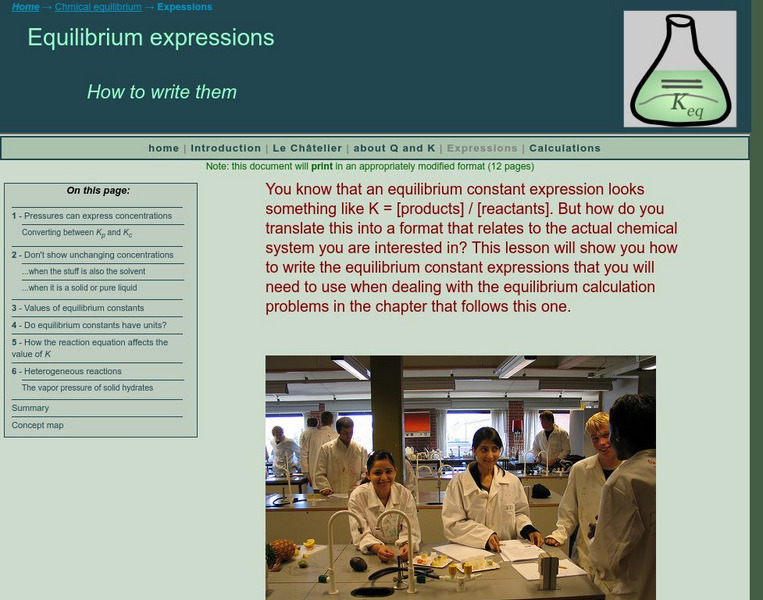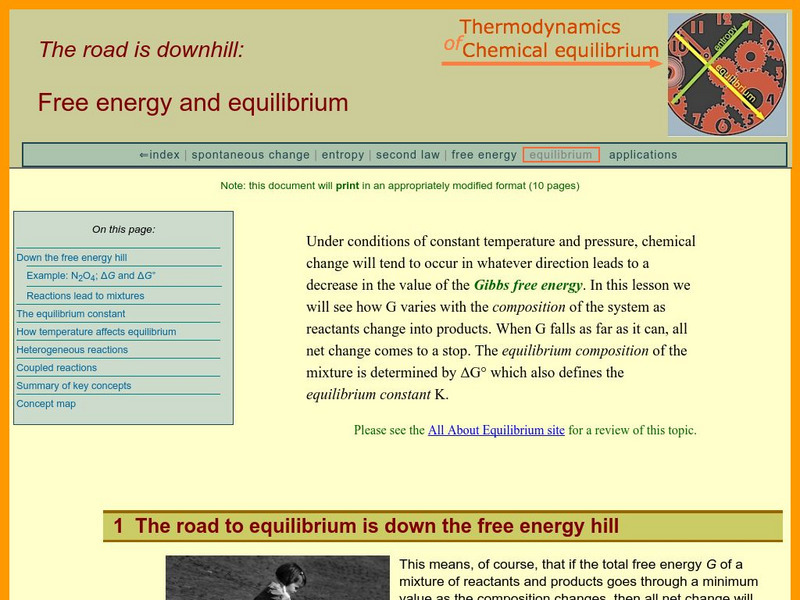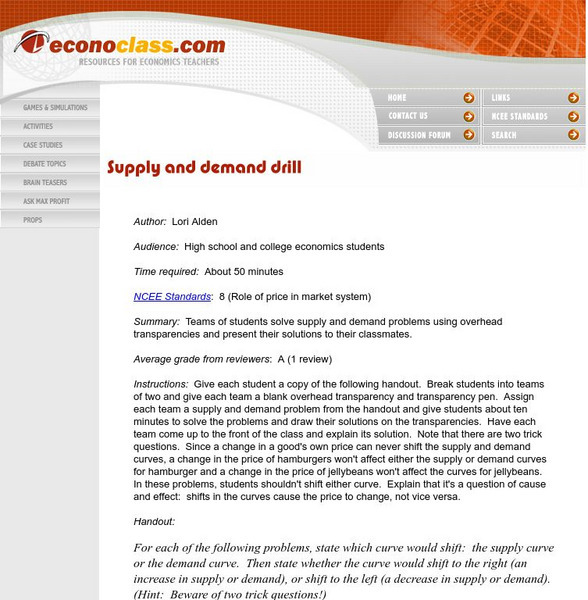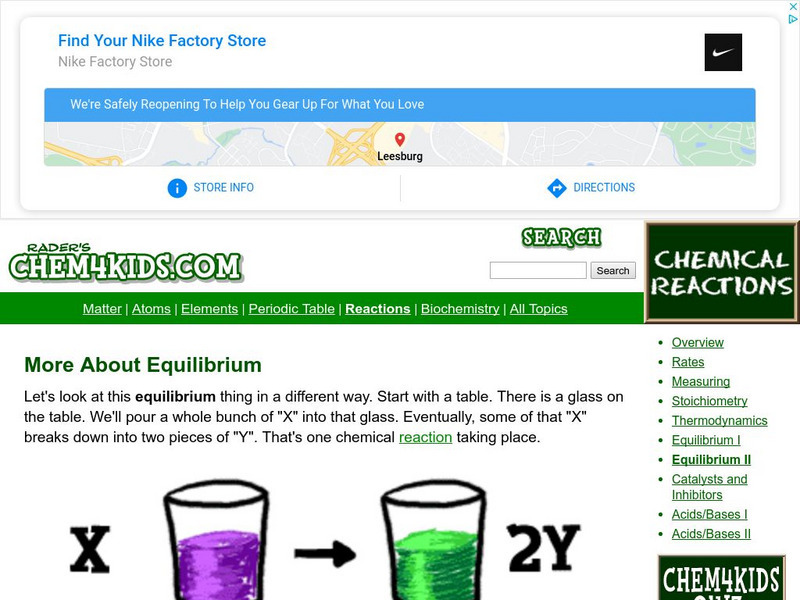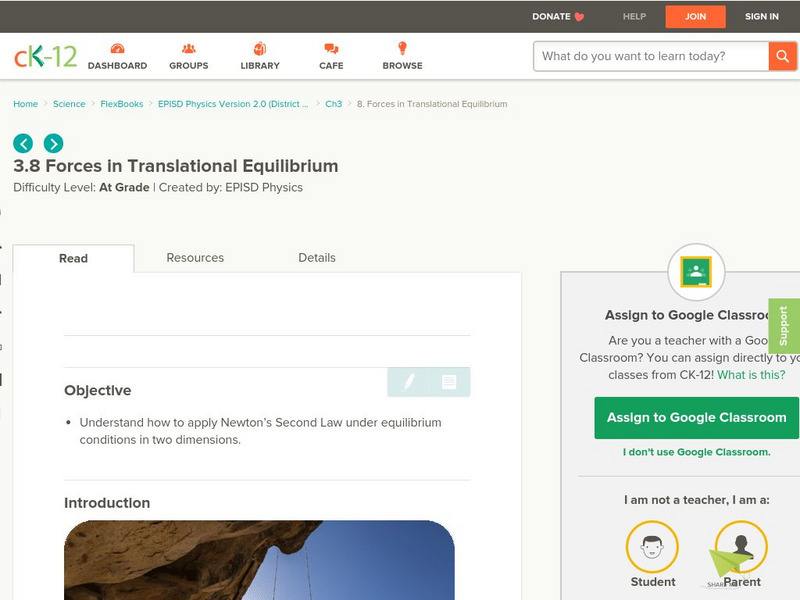Simon Fraser University
Chem1 Virtual Textbook: Energetics of Chemical Change
Energetics of chemical change is a section of a larger overview on Chemistry, which covers a variety of aspects. This section focuses on energetics and equilibrium, and chemical energetics. Examples, formulas, and pictures are provided.
Simon Fraser University
Chem1 Virtual Textbook: What Is Equilibrium?
Acting as an overview from the General Chemistry Virtual Textbook, this site sets down a definition of equilibrium and defines several types including mechanical equilibrium, thermal equilibrium, and chemical equilibrium.
Simon Fraser University
Chem1 Virtual Textbook: What Is the Le Chatelier Principle?
Acting as an overview from the General Chemistry Virtual Textbook, this site seeks to answer the question, what is the le Chatelier Principle and why is it important? The site provides the Le Chatelier's Principle in Le Chatelier's own...
Simon Fraser University
Chem1 Virtual Textbook: How to Write Equilibrium Expressions
Acting as an overview from the General Chemistry Virtual Textbook, this site explores a range of topics related to equilibrium expressions including concentrations and pressures in equilibrium expressions, unchanging concentrations,...
Simon Fraser University
Chem1 Virtual Textbook: Equilibrium Calculations
Acting as an overview from the General Chemistry Virtual Textbook, this site explores a range of topics related to equilibrium constants including measuring and calculating equilibrium constants, calculating equilibrium compositions from...
Simon Fraser University
Chem1 Virtual Textbook: Free Energy and Equilibrium
With an overview of topics related to chemical equilibrium, this site provides a foundation to a study of thermodynamics and free energy. Topics covered include the equilibrium constant, equilibrium and temperature, coupled reactions,...
Simon Fraser University
Chem1 Virtual Textbook: The Equilibrium Constant
With an overview of topics related to chemical equilibrium, this site provides a foundation to a study of thermodynamics and equilibrium. Included in the discussion with the equilibrium constant are topics such as equilibrium and...
Wikimedia
Wikipedia: Mechanical Equilibrium
Wikipedia provides information on mechanical equilibrium, the state of a mechanical system in which the sum of the forces on each particle of the system is zero.
Crescent Public Schools
The Internet Science Room: Salts
Students learn about chemical salts, crystalline compounds and the neutralization that occurs with them.
Other
South Western Learning: Econ News: The Market System Study Guide
South-Western College Publishing offers an outline written as a study guide for an exam, which gives basic definitions of different aspects of a market economy, graphs and examples, and sample study questions at the bottom.
Other
Chemguide: Le Chatelier's Principle
This page looks at Le Chatelier's Principle and explains how to apply it to reactions in a state of dynamic equilibrium. It covers changes to the position of equilibrium if you change concentration, pressure or temperature. It also...
Other
Rensselaer Polytechnic Institute: Chemical Equilibrium
This site from the Rensselaer Polytechnic Institute provides an introduction to chemical equilibrium, covering equilibrium expressions, the pH scale, and presenting how to plot log concentration diagrams.
Other
Amos Web Gloss Arama: Market Equilibrium
This economic glossary site gives a basic definition of market equilibrium.
Other
South Western Learning: Econ News: Comparative Statics: Perfect Competition
This site offers economics-based newspaper headlines and asks follow-up questions based on supply and demand in a perfectly competitive market.
Other
South Western Learning: Econ News: Perfect Competition
This site offers a variety of economics-related newspaper headlines in perfectly competitive markets, and each headline offers discussion questions related to that topic.
Econoclass
Econoclass: Supply and Demand Drill
This classroom activity provides students with many examples of changes in supply or demand.
State University of New York
State University of New York: Chromatography and Equilibrium
The following simulation explores the process of of chromatography and equilibrium.
State University of New York
State University of New York: Disturbing a Chemical Equilibrium
This system allows a system with a set of initial concentrations to come to equilibrium. Once that state is attained adjustments can be made by altering one or more species.
State University of New York
State University of New York: Equilibria and Volume
This simulation involves an explanation of equilibria and volume, including the nitorgen dioxide/dinitrogen tetroxide system.
State University of New York
State University of New York: Equilibrium Expressions
In this module students are asked to build the equilibrium constant expression for the reaction shown.
University of California
University of California, Berkeley: Immigration From Mexico
This article explores how immigration from Mexico has both helped and hurt the American economy.
Concord Consortium
The Concord Consortium: Molecular Workbench: Seeing Chemical Equilibrium
Observe a visual representation of the equilibrium of products and reactants in chemical reactions. Record data while the reactions are taking place and print out a report afterwards.
Chem4kids
Chem4 Kids: More About Equilibrium
Equilibrium in chemistry is two reactants combining together and then coming apart to their two parts. Review this resource featuring a way to approach chemical equilibrium.
CK-12 Foundation
Ck 12: Forces in Translational Equilibrium
[Free Registration/Login may be required to access all resource tools.] The following tutorial helps students to understand how to apply Newton's Second Law under equilibrium conditions in two dimensions.





